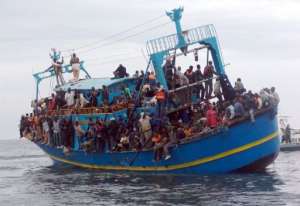
The media has been asked to intensify public education on the advantages and risks of illegal migration.
This would help ensure, that people are well informed on the likely out-come of travelling to other countries to seek greener pastures, especially when done illegally.
Mr. Paul Dillon, Communications Officer for the International Organization for Migration (IOM), Indonesia, said this when he when he opened a two-day Media Training on Ethical and Journalistic Reportage on Migrants in Accra.
He said whilst migration in itself could be useful to both the individuals directly involved and the larger society when done legally, people travelling to other countries through human smuggling and trafficking risked grave consequences such as deaths, extreme human rights abuse like slavery, as well as starvation and many more.
Mr. Dillon said it was worth noting that in-spite of the likely grim outcomes that migrants who travelled through human smuggling or trafficking schemes faced, the ignorance of these potential victims, prevented them from making informed decisions.
He observed that mainly, would-be migrants obtained information from sources such as their friends and family, social media, and other out-lets such as stories told by migrants who had returned.
Mr. Dillon said in-spite of all these information outlets the media played a key role, when it came to public knowledge on migration and all other related matters.
He said because of the credibility that the media enjoyed, it was well placed to educate the public on issues bordering on migration.
Mr. Dillon observed that with everyone looking up to the media for credible information, journalists had the responsibility to thoroughly educate people on all issues bordering on migration.
He said this would help potential migrants make well-informed decisions, and prevent some of the horrors of migration, such as mass deaths, kidnapping, slavery and many more.
Mr. Kojo Wilmot, National Project Officer, IOM-Ghana, said the IOM had a Migration Information Centre, where those who wanted to migrate could go for the right information.
He said with the emergence of many job recruitment agencies, it was very important for people to cross check from credible sources to ensure, that they were not playing into criminal schemes.
'There is also a Migration information Bureau at the Ghana Immigration Service, where people can verify information put out by these employment agencies,' he said.
In 2016, a total of 5,636 Ghanaians, consisting of 4,933 men, 170 women and 533 children, of which 499 were unaccompanied migrant children, arrived in Italy by boat, in search of better opportunities.
This made Ghana the 11th largest nationality to arrive on Italian shores for the year 2017.
An increase of over 27 per cent, as compared to the arrival of 4,431 Ghanaians to Italy in 2015.
In recent times, stories of abuse, deceit and suffering by some returning Ghanaian migrants, have drawn attention to the need for all stakeholders, to strengthen their resolve towards ensuring, that would-be migrants are well informed. The program was organized by IOM-Ghana.




 This IMANI job no dey pap; the people you are fighting for are always fighting y...
This IMANI job no dey pap; the people you are fighting for are always fighting y...
 Prof. Naana Opoku-Agyemang has changed; you can see a certain sense of urgency –...
Prof. Naana Opoku-Agyemang has changed; you can see a certain sense of urgency –...
 MFWA Executive Director slams Akoma FM for engaging in ‘irresponsible’ media pra...
MFWA Executive Director slams Akoma FM for engaging in ‘irresponsible’ media pra...
 ‘Women must become millionaires too’ — Prof Jane Naana on establishment of Women...
‘Women must become millionaires too’ — Prof Jane Naana on establishment of Women...
 Some believe only in Ghanaian votes, not Ghana — Kofi Asare jabs politicians
Some believe only in Ghanaian votes, not Ghana — Kofi Asare jabs politicians
 Plan to make BEST sole aggregator of Sentuo Oil Refinery will create market chal...
Plan to make BEST sole aggregator of Sentuo Oil Refinery will create market chal...
 2024 elections: I can't have the man I removed from office as my successor — Aku...
2024 elections: I can't have the man I removed from office as my successor — Aku...
 2024 Elections: Immediate-past NPP Germany Branch Chairman garners massive votes...
2024 Elections: Immediate-past NPP Germany Branch Chairman garners massive votes...
 Gov’t focused on making Ghana energy self-sufficient, eco-friendly – Akufo-Addo
Gov’t focused on making Ghana energy self-sufficient, eco-friendly – Akufo-Addo
 April 25: Cedi sells at GHS13.74 to $1, GHS13.14 on BoG interbank
April 25: Cedi sells at GHS13.74 to $1, GHS13.14 on BoG interbank
